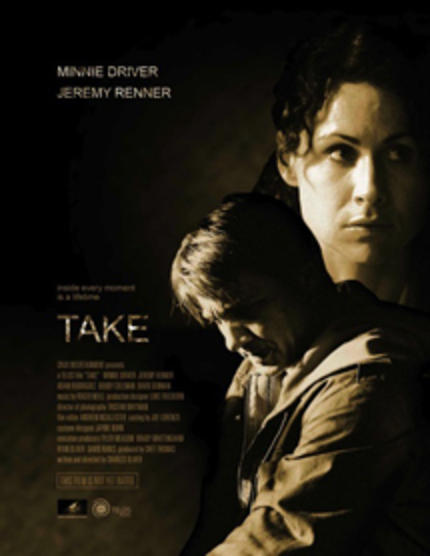IIFF 2008 - TAKE review

Anchored by a pair of strong performances from Minnie Driver and Jeremy Renner, Charles Oliver’s Take succeeds in spite of an unnecessarily convoluted framing device that jumps between multiple fields of time as its characters’ lives careen toward one another leading up to and following a tragic turn of happenstance. One can’t help but think Oliver’s choice in splicing space-time had something to do with undercutting the picture’s increasingly grim tone as it builds toward its climax, the state-sanctioned execution of Renner’s small-time thug for his involvement in the death of Driver’s young son.
Shuffling around its timeline, the film charts Driver’s annual voyage to the dust bowl penitentiary that will, this time around, finally be executing Renner. Along the way the events leading to Renner’s act of desperation recycle, giving perspective on both characters’ existence before and after their fates intersected. Driver and her husband struggle with news about their son’s learning disability and the financial hardship tied to it; Renner faces work at a dead-end job and an insurmountable gambling debt that forces him down a frantic path fraught with ill-conceived schemes that result in tragedy.
Take works best serving as a showcase for its two leads. Driver hasn’t really been provided with this taxing of a role before and she excels, offering a layered turn less predictable than the path her character is eventually forced down. Renner, an under-valued charaacter actor who delivered an intense performances as the titular lead in David Jacobson’s superlative Dahmer, turns in another focused performance as a man so far past his wits’ end he sees no way out of his self-imposed purgatory.
Where the film suffers is in its structure. The decision to break up the flow of events with constant flashes forward and backward adds nothing – it fails to reveal anything further about the characters, ending as nothing more than a hollow exercise in style. This is particular damning with Renner, who compared to Driver is underserved by the script when it comes to on-screen character development. Had Oliver’s decision to chop the material up advanced even just his character, it would be forgivable to a degree; such is unfortunately not the case.
Tech credits are top-flight across the board. The compositions are chocked full of contrasting bright colors and washed-out facades, and a pivotal late-game robbery is infused with a manic energy. Despite the afore-mentioned over-usage of editing, the film does flow well within its regrettable construct. The omnipresent score sets an appropriately mournful tone.
Take does enough right that there’s something to be gained from the experience. It isn’t that film fails to engage – it just seems overly satisfied with its warping structure that adds nothing beyond a superficial sheen. The same result could’ve been achieved minus the editorial gymnastics. That the film could’ve used the same disjointed approach to further illuminate its characters and doesn’t is a particularly difficult nit to overcome, so it’s a credit to the performers and the seed of the script that film works to the degree it does in spite of itself.







